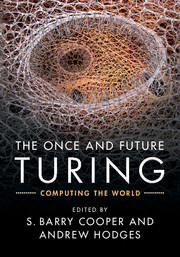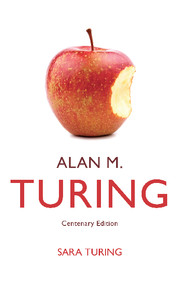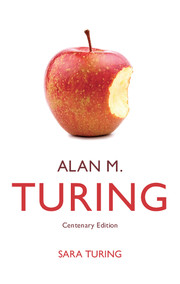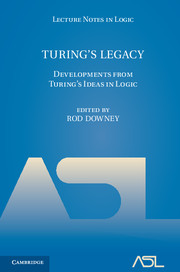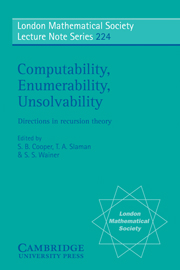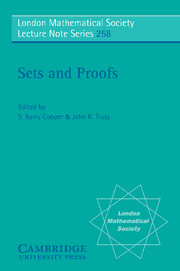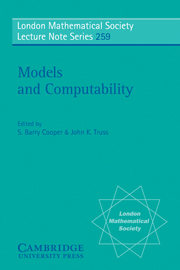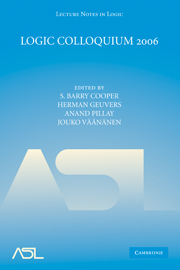The Once and Future Turing
Alan Turing (1912–1954) made seminal contributions to mathematical logic, computation, computer science, artificial intelligence, cryptography and theoretical biology. In this volume, outstanding scientific thinkers take a fresh look at the great range of Turing's contributions, on how the subjects have developed since his time, and how they might develop still further. The contributors include Martin Davis, J. M. E. Hyland, Andrew R. Booker, Ueli Maurer, Kanti V. Mardia, S. Barry Cooper, Stephen Wolfram, Christof Teuscher, Douglas Richard Hofstadter, Philip K. Maini, Thomas E. Woolley, Eamonn A. Gaffney, Ruth E. Baker, Richard Gordon, Stuart Kauffman, Scott Aaronson, Solomon Feferman, P. D. Welch and Roger Penrose. These specially commissioned essays will provoke and engross the reader who wishes to understand better the lasting significance of one of the twentieth century's deepest thinkers.
- Discover Alan Turing's legacy in fields as diverse as computer science, mathematical biology, philosophy and cryptology
- Contains original contributions from world-leading experts on Turing and his work
- Approachable essays suitable for any reader interested in the development of science
Reviews & endorsements
'The 15 highly readable essays gathered here, each worth a review, celebrate Turing's centenary by exploring current developments and philosophical ramifications descending from many sides of Turing's work, not just his famous theory of computation and his code-breaking exploits but also his interests in logic, artificial intelligence, morphogenesis, pattern formation, the Riemann hypothesis, etc … Summing Up: Recommended. All readers.' D. V. Feldman, CHOICE
'The book under review is a collection of 15 papers written by outstanding scientists. It gives a look at the range of A. M. Turing's contributions and shows how the subjects have been developed since his time and how they might develop still further. The papers are divided into five groups. … Papers collected in this volume will be interesting to all readers who wish to understand better the lasting significance of Alan Turing and his ideas.' Roman Murawski, Mathematical Reviews
Product details
No date availableHardback
9781107010833
395 pages
257 × 176 × 26 mm
1.04kg
49 colour illus. 4 tables
Table of Contents
- List of contributors
- Introduction S. Barry Cooper and Andrew Hodges
- Part I. Inside our Computable World, and the Mathematics of Universality:
- 1. Algorithms, equations, and logic Martin Davis
- 2. The forgotten Turing J. M. E. Hyland
- 3. Turing and the primes Andrew R. Booker
- 4. Cryptography and computation after Turing Ueli Maurer
- 5. Alan Turing and enigmatic statistics Kanti V. Mardia and S. Barry Cooper
- Part II. The Computation of Processes, and Not Computing the Brain:
- 6. What Alan Turing might have discovered Stephen Wolfram
- 7. Designed versus intrinsic computation Christof Teuscher
- 8. Dull rigid human meets ace mechanical translator Douglas Richard Hofstadter
- Part III. The Reverse Engineering Road to Computing Life:
- 9. Turing's theory of developmental pattern formation Philip K. Maini, Thomas E. Woolley, Eamonn A. Gaffney and Ruth E. Baker
- 10. Walking the tightrope: the dilemma of hierarchical instabilities in Turing's morphogenesis Richard Gordon
- Part IV. Biology, Mind, and the Outer Reaches of Quantum Computation:
- 11. Answering Descartes: beyond Turing Stuart Kauffman
- 12. The ghost in the quantum Turing machine Scott Aaronson
- Part V. Oracles, Infinitary Computation, and the Physics of the Mind:
- 13. Turing's 'oracle': from absolute to relative computability and back Solomon Feferman
- 14. Turing transcendent: beyond the event horizon P. D. Welch
- 15. On attempting to model the mathematical mind Roger Penrose
- Afterword S. Barry Cooper and Andrew Hodges.

